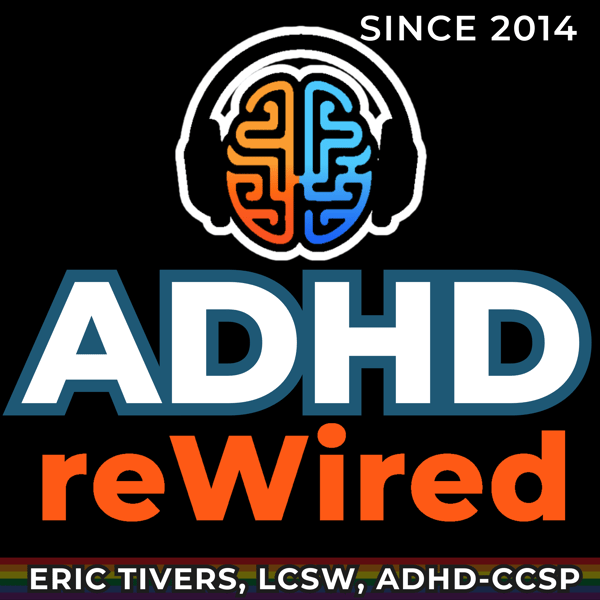145 | Live Panel of ADHD Experts
ADHD reWired
Eric Tivers, LCSW, ADHD-CCSP
4.7 • 919 Ratings
🗓️ 6 December 2016
⏱️ 96 minutes
🧾️ Download transcript
Summary
Transcript
Click on a timestamp to play from that location
| 0:00.0 | That was an important clarification because the idea of having ADHD isn't something you grow out of. |
| 0:06.0 | It's really the treatment and the need for treatment. |
| 0:09.0 | And that's part of the discussion here too is just because somebody is found to have the diagnosis of |
| 0:13.7 | ADHD does not necessarily mean that they would need treatment the treatment would |
| 0:18.3 | be based on how much it's having an impact on their social or occupational or |
| 0:22.0 | academic functioning. |
| 0:23.0 | 80HD, rewired episode 145. This is the show designed for those of us with really good |
| 0:37.7 | intentions but a slightly wandering attention. My name is Eric Tivers. I'm a licensed clinical social worker, coach, and speaker. |
| 0:47.0 | The website is ADHD rewired.com. We know that starting is the hardest part, so let's get started. But first, let me tell you about this. |
| 0:59.0 | The ADHD rewired coaching and Accountability Group is truly changing people's lives. |
| 1:06.0 | I want you to hear some of the newest voices, the most recent graduates of the most recent coaching group. |
| 1:13.0 | Our next group is just around the corner, |
| 1:15.2 | and I want you to hear what's just a few people |
| 1:18.6 | from the most recent group said |
| 1:21.3 | during our last session of the fall coaching group. |
| 1:25.0 | I was feeling very overwhelmed with everything that I had to do, |
| 1:30.0 | with getting organized, not being able to get things done, |
| 1:33.2 | and I gained a lot of tools and strategies to help me with that. |
| 1:38.7 | I feel like for the first time I have confidence that I will do that. I also feel like I have a group of |
| 1:46.1 | people who I can count on to help hold me accountable. The great thing is that you helped us sort of dream big and plan big and do our mind mapping and look at sort of the next few years or year and what's important what are our priorities and then having the |
| 2:04.0 | accountability partners build the habits of breaking things down into actual |
| 2:08.9 | manageable to do lists and then following up with that it wouldn't just be one big thing |
... |
Please login to see the full transcript.
Disclaimer: The podcast and artwork embedded on this page are from Eric Tivers, LCSW, ADHD-CCSP, and are the property of its owner and not affiliated with or endorsed by Tapesearch.
Generated transcripts are the property of Eric Tivers, LCSW, ADHD-CCSP and are distributed freely under the Fair Use doctrine. Transcripts generated by Tapesearch are not guaranteed to be accurate.
Copyright © Tapesearch 2025.

